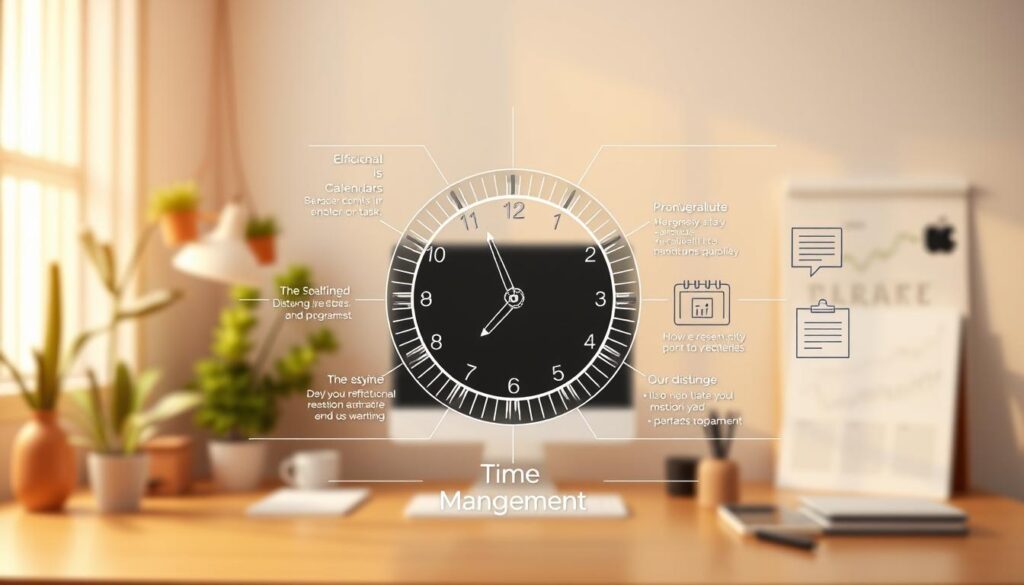Time management is super important for reaching your goals and being super productive. In our fast world, knowing how to manage time is key for success in life and work. This piece shares top tips and strategies for amazing productivity. Use these secrets to boost your time management and reach your peak potential.
Understanding Time Management
Time management is about planning and controlling how much time to spend on specific tasks. This approach helps use resources well and get the best results. By managing time wisely, people can focus on important tasks first and get more done.
Knowing how to manage your time is key in life and work. It means you can reach your goals and hit deadlines. Research shows that people are only productive for about three hours a day. So, it’s crucial to learn to manage time effectively, not just stay busy. This skill helps increase productivity and find a good balance between work and fun.

The Importance of Productivity
Understanding how vital productivity is can really help those looking to grow personally and professionally. Being highly productive improves individual performance. It also helps an organization succeed. When people concentrate on being productive, they unlock benefits that make work better.
Being productive leads to feeling more motivated and handling stress better. People who manage their time and tasks well are less anxious. They see real results from their work. This encourages them to be even more productive. It starts a positive cycle, pushing them towards their goals.
Productivity is closely tied to success. Meeting personal goals and moving forward in a career depends a lot on being productive. Recognizing and using productivity leads to job happiness and better work. Ultimately, this means a more rewarding career.
Identifying Your Peak Productivity Hours
Finding your best productivity hours is key to managing time well. These are times when you have the most energy and focus. It’s the perfect time to take on tough tasks. Knowing when you work best lets you match your big tasks with your high-energy moments.
Studies show that high achievers plan their day around these high-energy times. They do their hardest tasks then to work more efficiently. This way, they get more done and feel less stressed than working at less ideal times.
- Track your energy levels throughout the day to find when you feel most alert.
- Identify tasks that require deep focus and schedule them during these peak hours.
- Experiment with different routines to refine your understanding of your personal productivity patterns.
Time Management Techniques to Boost Efficiency
Using good time management strategies can really up your productivity game. Here are some methods that can organize your tasks and get better results.
The “One Big Thing” Rule
The “One Big Thing” rule teaches us to focus on just one key task each day. Choose an important task that will make you feel accomplished. This way, you can really focus your efforts without getting sidetracked. It helps you concentrate better, making you more productive.
Time Blocking for Better Focus
Time blocking means dividing your day into set chunks for different tasks. It helps you plan your day before it starts. You set aside specific times for work, breaks, and meetings. This approach sharpens your focus and curbs the temptation to juggle tasks, which can slow you down.
Utilizing the Two-Minute Rule
The Two-Minute Rule is simple: if something takes less than two minutes, do it right away. This stops small tasks from building up and boosts your efficiency. It helps keep your task list manageable, freeing up time for bigger projects that need more planning.
Batching Similar Tasks for Maximum Impact
Batching means doing similar tasks all at once to work more smoothly and stay focused. It makes you more efficient by saving time spent switching between tasks. By grouping tasks, you focus your efforts better and get things done faster.
Setting Effective Deadlines
Deadlines are crucial for managing time well and boosting productivity. By setting clear deadlines, people can focus better and put off tasks less. Deadlines are incredibly important because they push us to finish tasks on time.
It’s important to find a balance when creating deadlines. They should be challenging yet achievable. Here are some tips on how to set deadlines effectively:
- Set specific, quantifiable goals that clearly define what needs to be achieved.
- Break larger projects into smaller, manageable tasks with individual deadlines.
- Assess your workload and time availability before establishing due dates.
- Account for potential obstacles and adjust deadlines accordingly.
Using these tips can greatly improve your chances of meeting deadlines. This leads to better productivity and a smoother experience in managing your time. Accepting the importance of deadlines helps you meet your goals with more confidence and efficiency.
The Science Behind the Pomodoro Technique
The Pomodoro Technique is a unique way to manage time by working in short bursts. It divides work into 25-minute intervals, called “Pomodoros,” with brief breaks in between. It helps you work with more focus and get more done.
Using this technique keeps your attention sharp and lets you rest before you get too tired. A quick 5-minute break after each session helps clear your mind. This makes you more efficient and helps avoid burnout.
When people use the Pomodoro Technique, they learn about their own work habits. It helps them find the best times to work and how to make their day more productive. Making this method part of your routine can greatly improve how you manage your time.
Understanding Parkinson’s Law in Time Management
Parkinson’s Law says that work grows to fill the time we have to do it. Knowing this can really help people manage their time better. It’s very important to use our time well because it affects how we finish tasks. If we give ourselves too much time to do something, we will take too long.
To avoid wasting time, it’s good to set shorter deadlines. This makes us work faster and stay on track. For example, when you make big projects into smaller tasks with their own deadlines, everyone knows what they should do. This stops us from putting things off and makes sure we get things done on time.
Knowing about Parkinson’s Law helps us make our work process better. By being smart about how we plan our time, we can get more done and reach our goals faster.
The Value of Saying No Effectively
Being able to say no is key to managing time well. It lets people choose what truly matters to them. It stops their schedules from getting too packed.
Setting limits on your time is crucial. Saying no to things that aren’t as important saves your valuable time. Here’s how to say no in a nice but firm way:
- Be direct but respectful. A simple “No, thank you” can be enough.
- Offer an alternative if you can. Suggest someone else who might help, showing you still care.
- Practice being assertive. When you know your priorities, it’s easier to protect your time.
- Use body language to show your seriousness. Look people in the eye to show you mean what you say.
By using these ways to say no, people can keep their focus. They’ll get more done by guarding their time and sticking to what’s important to them.
The Importance of Prepping the Night Before
Getting ready the night before is key to doing well the next day. It helps you start your morning focused and ready. This way, you avoid distractions and ease into your work.
To really boost your productivity, plan ahead every night. Here are some tips to make your evening routine work for you:
- Make a list of what you need to do tomorrow, focusing on the most important tasks.
- Clean up your work area. This helps create a good space for getting things done.
- Pick out what you’ll wear to save time and decide easier in the morning.
- Think about your goals for the next day to set a clear direction.
Making night prep a habit can make your daily planning much smoother. It prepares you to face whatever comes your way.
Leveraging Automation for Better Time Management
In the busy world we live in, using automation tools is key to getting more done. These tools help us work smarter by taking care of tasks like managing social media, setting up meetings, and sorting emails. So, people can spend their time on bigger challenges.
Here are some great tools to make your work easier:
- Zapier: Connects apps and automates workflows without programming skills.
- Trello: Automates project management and facilitates team collaboration.
- Hootsuite: Manages social media posts and engagement effortlessly.
- Calendly: Simplifies scheduling meetings, removing back-and-forth emails.
Using these tools can really boost how much you get done. You’ll spend less time on everyday tasks. This lets you focus more on important goals. Automation changes how we work, letting us dive deeper into our creative projects.
Tracking Your Progress and Performance
Keeping track of your performance is key to improving your work and hitting your goals. By measuring productivity regularly, you can find out what works best and what needs more effort. This way, you can see your strong points and where you can get better.
An effective strategy for tracking progress includes:
- Daily evaluations of completed tasks to understand daily achievements and struggles.
- Setting clear, measurable goals that facilitate precise performance tracking.
- Utilizing journals or digital tools that allow for easy documentation and reflection on progress.
Adding these habits to your day helps you stay on track and be proactive. It helps you use your time and resources well. By always checking how you’re doing, you’re set up to make smart changes for the better.
Conclusion
To end our discussion on time management, it’s key to know mastering it can hugely boost your productivity and happiness. Strategies like finding your most productive times and using the Pomodoro Technique are real game-changers. They can shake up your daily habits for the better.
This summary is a nudge to start using at least some of these time management tips. By setting smart deadlines and using technology to your advantage, you’ll work smarter. This makes your day-to-day tasks smoother and more organized.
In the end, putting these time management secrets to work helps you reach your goals more smoothly. Think about how these methods can fit into your life, both at work and at home. They’re key to unlocking your full potential and ramping up your productivity.



